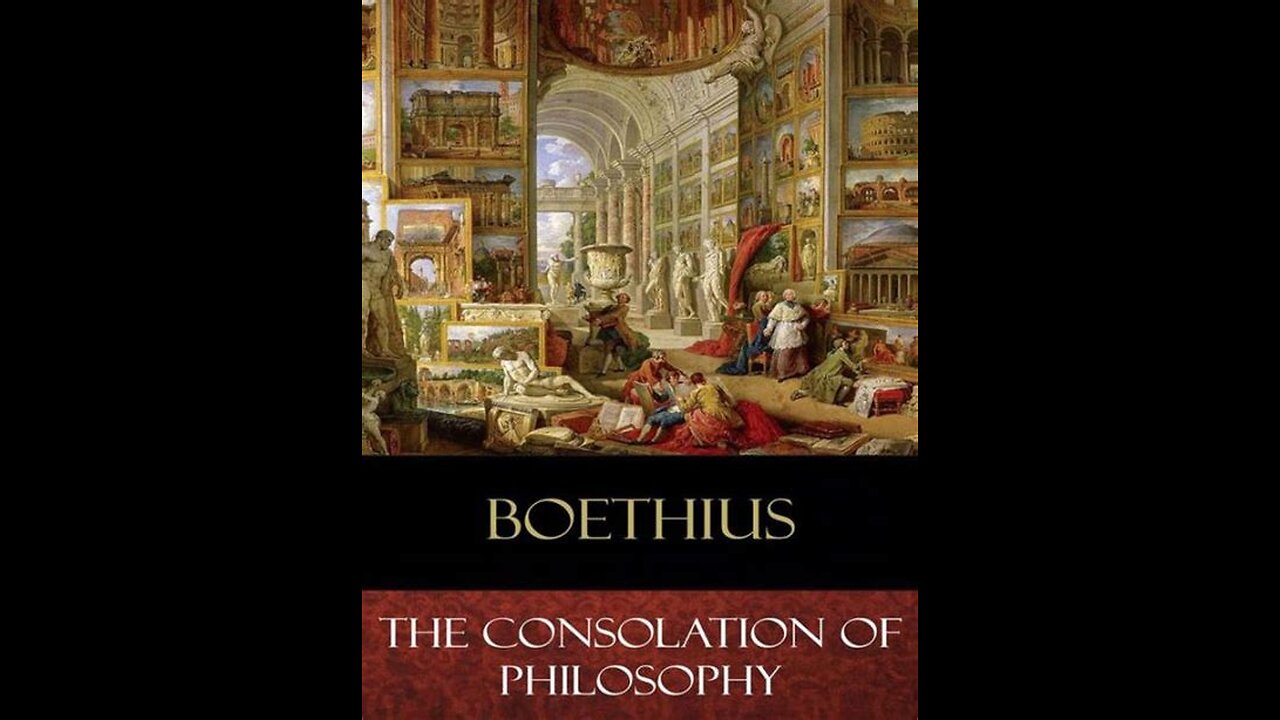Premium Only Content

The Consolation of Philosophy by Boethius | Summary and Critique
Buy Here: https://amzn.to/4gGnSUE
"""The Consolation of Philosophy"" is a philosophical work written by the Roman statesman and philosopher Anicius Manlius Severinus Boethius in the early 6th century. Boethius wrote this book while he was imprisoned awaiting execution, and it takes the form of a dialogue between himself and Lady Philosophy, who appears to him in his distress.
The book begins with Boethius feeling despondent and abandoned, as he faces impending death and laments the injustices of the world. In his despair, Lady Philosophy appears to him as a wise and compassionate figure, seeking to console him and restore his faith in the order of the universe.
Lady Philosophy engages Boethius in a series of discussions about the nature of happiness, the problem of evil, the relationship between God's foreknowledge and human free will, and the transitory nature of worldly success and fortune. She challenges Boethius's distorted perceptions and helps him see that true happiness lies in virtue and the pursuit of goodness, rather than in external circumstances.
Throughout the dialogue, Lady Philosophy presents a Stoic perspective, emphasizing the importance of reason and the need to accept and endure the vicissitudes of life. She argues that true happiness is not dependent on external factors but can be attained through a proper understanding of the nature of reality and one's place in it.
""The Consolation of Philosophy"" is regarded as one of the most influential philosophical works of the Middle Ages. However, there are a few critiques that can be raised:
1. Religious Overtones: The book has strong religious undertones, reflecting Boethius's Christian beliefs. While this may resonate with some readers, it limits the book's appeal to those who do not share the same religious worldview.
2. Simplistic Approach to Happiness: Lady Philosophy's emphasis on virtue and reason as the keys to happiness can be seen as oversimplified. The complexities of human emotions, desires, and the pursuit of happiness are not fully addressed, potentially leaving some readers unsatisfied.
3. Lack of Diversity in Perspectives: The dialogue is primarily between Boethius and Lady Philosophy, without significant engagement with alternative viewpoints. This narrow scope may limit the book's ability to provide a well-rounded exploration of the topics discussed.
4. Contextual Limitations: Boethius wrote the book within the specific historical and personal context of his imprisonment, which may make it less accessible or relatable to readers who do not share that context.
Overall, while ""The Consolation of Philosophy"" offers valuable insights into topics such as happiness, fate, and the nature of existence, it is important to approach the work with an understanding of its historical and religious context, as well as its limitations in addressing the complexities of human experience."
-
 43:23
43:23
Donald Trump Jr.
5 hours agoNo Clap: Dems are a Disgrace but My Father is Bringing Back Common Sense | Triggered Ep.222
102K91 -
 18:29
18:29
The Rad Factory
1 day ago $0.02 earnedBuilding Shred Eighty a Custom Honda Snow Kart
1.51K2 -
 UPCOMING
UPCOMING
Precision Rifle Network
1 day agoS4E7 Guns & Grub - What makes group size increase?
1.12K1 -
 46:29
46:29
SGT Report
23 hours agoAMERICA IS BACK! BYE BYE IRS!! -- Sam Anthony
40.9K76 -
 8:56:13
8:56:13
Dr Disrespect
12 hours ago🔴LIVE - DR DISRESPECT - WARZONE - 150 PLAYER LOBBIES
165K20 -
 1:27:35
1:27:35
Redacted News
6 hours ago"This is NOT normal" Trump just destroyed the woke mob as Dems in disarray | Redacted News Live
147K268 -
 1:39:52
1:39:52
Vigilant News Network
8 hours agoUNHINGED: Dems Say That Elon Needs to ‘Go Back to AFRICA?’ | The Daily Dose
95.4K19 -
 1:13:13
1:13:13
Sean Unpaved
7 hours ago $0.89 earnedQB Carousel with Guest Coach Herm Edwards
80K2 -
 1:04:28
1:04:28
Crypto Power Hour
1 day ago $5.86 earnedThe Crypto Power Hour - ‘In Crypto We Trust’
80.2K8 -
 28:55
28:55
CatfishedOnline
7 hours agoWoman Love Bombed by Salt-and-Pepper Scammer
47K6